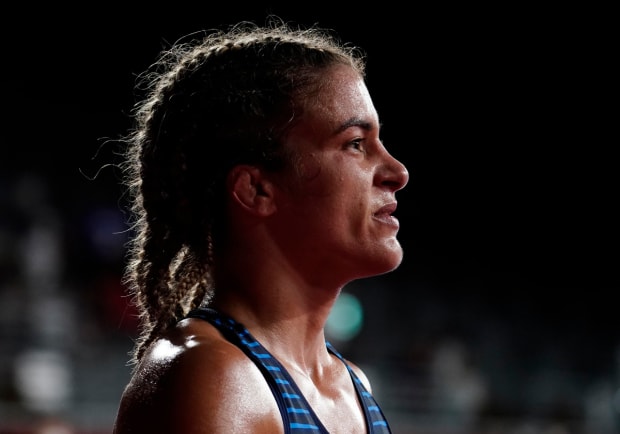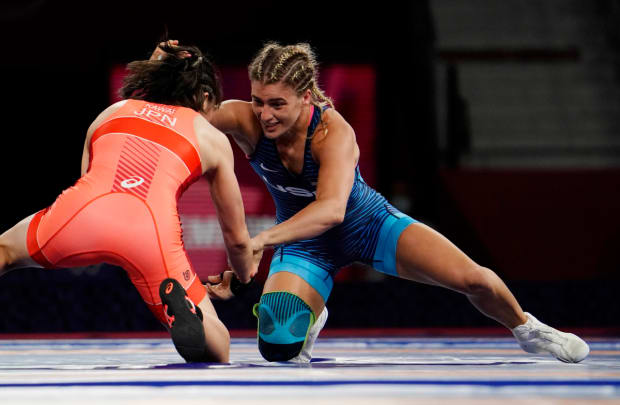Despite a loss in the semifinals, the 29-year-old American is grateful to be back at the Games—and within one match of the victory podium.
Sign up for our free daily Olympics newsletter: Very Olympic Today. You'll catch up on the top stories, smaller events, things you may have missed while you were sleeping and links to the best writing from SI’s reporters on the ground in Tokyo.
TOKYO — The random chatter used to take Helen Maroulis to a dark place of despair. On Wednesday, it helped bring her back to within one match of the victory podium at the Olympics. “She’s feeling it, Helen,” one voice yelled from Maroulis’ corner. “Take her. Take her,” shouted another.
Those were the sounds Maroulis craved. They brought the Olympic gold medalist from Rio back to another run at these Games, at age 29. With victories in her first two matches and defeat in a third on Wednesday, the Maryland native will wrestle for a bronze medal in the 57kg class on Thursday. It’s a wonder she made it back at all.
At a pro tournament in India in 2018, Maroulis absorbed a seemingly innocent slap to the forehead from hometown favorite Pooja Dhanda. It might as well have been a love tap from a kitten after all the bruises, throws and takedowns Maroulis had shaken off over the years. Instead, what followed were days of disorientation, nights without sleep and voices that were either real or imagined. Sometimes Maroulis couldn’t tell. Concussions? Surely wrestlers have had worse, especially grapplers of her standing.

Promoters in India wanted her to keep wrestling, so she did. Back home, Maroulis’s coaches wanted her back in the gym, so she went. She wrestled at the World Championships that year, lost her first match and damaged her shoulder.
Concussion protocol has never been a favored phrase in a sport that esteems such resilience, grit and sacrifice. USA Wrestling has since strengthened its protocols largely because of what Maroulis endured since that first slap above the nose. She was diagnosed with post-concussion stress disorder and brought to a psychiatric treatment center in Utah. Maroulis lay awake, cried and had made peace with the idea that she’d never wrestle again. “I just wanted to know from the doctors, Hey, will I have this for the rest of my life? Is my life going to be normal again?”
Of course, a normal life doesn’t get you to the Olympics. First there were the days when boys were too embarrassed to wrestle her. Competing as a freshman for Magruder High School in Rockville, Md., she became the first wrestler to place at the Maryland state championships. Some foes would get sick rather than lose to a girl, felled by an unspoken case of Helen-itis.
In 2011 and ’12, Maroulis reached the world championships but dropped matches to Saori Yoshida, the nearly unbeatable Japanese legend who would go on to win three Olympic gold medals and 13 world titles. The losses steeled Maroulis, who won the world crown at 55 kg in 2015, while Yoshida competed in a different division. With weight classes truncated from Worlds to Olympics, Maroulis had to go through Yoshida to win gold in Rio at 53kg. Her 4–1 triumph reminded some in the sport of Rulon Gardner’s upset of Russia Alexander Karelin at the Sydney Games in 2000.
The wrestling world celebrated her. Her father’s home island in Greece held a day to honor her. That was Maroulis at her peak. In 2018, she was at her depths. “Wrestling was the furthest thing from my mind,” she says, “but how do you think straight when your brain is not working properly?”
Maroulis moved back with her parents, John and Paula, and began mixing rest with therapy. She also began light workouts in the gym, first once a week, then twice. As her head gradually cleared, she thought about wrestling again, then dismissed it, then took the one-year break from COVID-19 as “either a blessing in disguise or a curse, since I didn’t know if I’d get hurt again.”
Maroulis battled self-doubt away from the mat so often, it seemed only intermittent hints of progress in the gym were therapy she could rely on. In April, she won the 57kg weight class at the Olympic Trials in Fort Worth. “I never thought I’d be able to wrestle again,” she says. “And I certainly never thought it would be on the Olympic stage.”
In Tokyo, Maroulis opened the tournament Wednesday with an 8–4 victory against China’s Rong Ningning, the tournament’s No. 4 seed who had taken a 3–0 lead in the match. Ever resilient, Maroulis emptied her arsenal, scoring with a gut wrench, a counter and two takedowns to win the first match.

In her second match, Maroulis blanked Ukraine’s Tetyana Kit, 8–0, with a defensive clinic, turning every one of Kit’s attacks into a scoring opportunity and ultimately four takedowns of her own. A world bronze medalist in 2015, Kit could only wave her hand in frustration as the final seconds ticked away.
That set up another confrontation with an Olympic champion from Japan. Risako Kawai had won the 63kg class in Rio before gradually moving down to the same weight as Maroulis and capturing three world titles along the way. If there were hints of hesitation and doubts left in Maroulis’s head, she wonders if they might have stifled her against Kawai. The normally fiery Japanese played to Maroulis's caution in winning a 2–1 match in which all three points were awarded for passivity. “I expected her to shoot [attack] a lot more,” Maroulis said after the match. “I respected that too much. I felt it wasn’t the best of me, but I really wanted to represent Team USA.”
Maroulis will wait for repechage matches on Thursday morning to see who she will wrestle for a bronze medal—two are awarded in wrestling—later in the day. Kawai will face Iryna Kurachkina of Belarus later for gold. Maroulis doesn’t mind the cacophony from a large arena and jokes that the empty stands in Tokyo aren’t as much of a help as one would think for a concussion sufferer. “I’m better now, so I like the noise,” she says. “For now, this is a gift. It’s great to be able to do what I love. If you told me a year ago I’d be this healthy, that I could come back, I wouldn’t have believed you.”
More Olympics Coverage
• Teens Sweep the Medals, Show Unique Culture of Park Skateboarding at Olympics
• Bryce Wettstein Is a Free Spirit, Flying High
• Track and Field Rivalries Power Excitement, Results at Tokyo Olympics
• Gabby Thomas Sets New Standard for Sprinters, On and Off the Track